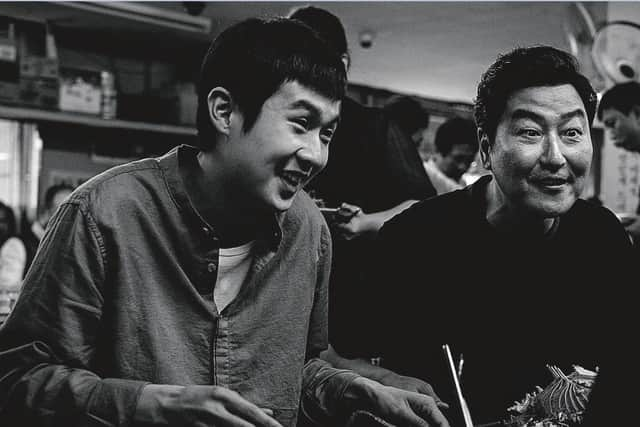Film reviews: How to Build a Girl | Parasite: Black-and-White Edition | Alice | The Traitor


How to Build a Girl (15) **
Parasite: Black-and-White Edition (15) ****
Alice (15) ***
The Traitor (N/A) ***
In How to Build a Girl, Caitlin Moran’s semi-autobiographical coming-of-age novel never quite comes to life with the sharpness of the columnist’s own writing. Mythologising her teenage journey from Wolverhampton to London to become a music critic for Melody Maker in the early 1990s, Moran’s script suffers the same problem as the film version of co-screenwriter John Niven’s 1990s-set music industry novel Kill Your Friends: the caustic wit and customary warmth of her prose sounds flat and contrived coming out the mouths of the actors. That’s too bad because even with a distracting Midlands accent, Booksmart star Beanie Feldstein is well-cast as Moran cypher Johanna Morrigan, an irrepressibly smart working-class girl who lands a gig writing for NME sound-alike the D&ME (short for the Disc and Music Echo) after submitting an earnest review of the Annie soundtrack that the music weekly’s Oxbridge-dominated staff think is a piss-take.
As both Johanna (an awkward, guileless, poetry-loving bibliophile yearning to escape the narrowing constraints of her loving yet needy extended family) and Dolly Wilde (Johanna’s cynical alter-ego, whom she invents after imbibing her fellow hacks’ cooler-than-thou approach to music criticism), Feldstein has the right mix of vulnerability and brazen self-confidence to sell us on the complex performative nature of adolescence. But whether it’s allowing herself to fall for a Jeff Buckley-esque alt-folk demigod she’s been sent to interview or taking responsibility for her own sexual experimentation and subsequent relationship mistakes, Feldstein’s take on the character is frequently hampered by the film’s eagerness to make her more likeable. It’s frustrating because Moran’s music criticism was often more entertaining than the bands she was writing about; in those inky pages, she was the star and her subsequent career is a testament to that. Alas, while the film, which is directed by Coky Giedroyc, makes cursory acknowledgment of this by having Dolly Wilde acquire her own groupies at one point, it also betrays that crucial sense of identification by transforming into a weird mea culpa for someone having strong opinions on mediocre art. By those standards this probably expects a pass.
Advertisement
Hide AdParasite: Black-and-White Edition isn’t the first major movie to get a black-and-white reissue (Mad Max: Fury Road got a “Black and Chrome” edition a couple of years back) and it’s not even the first Bong Joon-ho film to undergo the process (his 2009 film Mother had one too). But the surprise Oscar-winner’s increased profile and intricately worked-out structure makes it an intriguing one to rewatch through such a tonally stark lens.


Although director Bong’s jokey confession in interviews that it’s partly a vanity cut is unlikely to alleviate charges of cashing in, the new colour-drained version does make the disparity between the two worlds the families at the centre of the film inhabit seem even more pronounced. What’s interesting – and kind of brilliant – is that this in turn further muddies the film’s many ambiguities, with the shadowy noir lighting of the new version emphasising the cockroach-like adaptability of the poorer Kim family: as they insinuate themselves into the sleek modernist home of the tech-rich Park family, their dubious means of survival – which variously involve preying on an underage girl, sabotaging the careers of low-income workers and attempted and actual murder – can’t help but underscore the parasitic nature of a society that not only encourages everyone to leech off everyone else, but is also designed to keep everyone in their place while simultaneously encouraging everyone to strive for the same things. That it does this with empathy for every character is part of its greatness. Even in black and white nothing is black and white.
In Alice, a straight-laced Parisian mother (Emilie Piponnier) plunges down the rabbit hole of high-end prostitution after discovering her aspiring novelist husband has put their home at risk by secretly squandering their savings on the escort service she ends up working for. What follows in Australian director Josephine Mackerras’s French-language debut is an increasingly nuanced drama about a woman put in an impossible situation discovering who she is and why she’s ended up where she has. Bolstered by a star-making turn from Piponnier, the film also benefits from Mackerras’s lightness of touch, which offsets the potential darkness of the story at crucial points to make the emotional payoff it builds towards hit home harder.
Set over 30 years and boasting some dazzling set-pieces, The Traitor sees veteran Italian filmmaker Marco Bellocchio belatedly respond to the dominance of Martin Scorsese’s Americanised view of the mob with this based-on-fact account of the life of mafia informant Tommaso Buscetta (Pierfrancesco Favino), whose decision to turn against the Cosa Nostra in the mid-1980s brought down many of its top lieutenants in a sensational trial. The trial itself is dramatised in lengthy scenes that are dense with information and bizarre twists, but, perhaps as a result, Bellocchio’s need to jolt the film to life with technically audacious sequences – such as a stunning point-of-view shot of a Buscetta’s car being flipped over the side of a cliff by the blast from a car bomb – reinforces all the ways the film fails to find a consistently engaging rhythm. ■
How to Build a Girl is available to stream on digital platforms including Amazon and iTunes; Parasite: Black-and-White Edition is available on demand from Curzon Home Cinema and will be available in selected cinemas from 31 July; Alice is available to stream on platforms including Curzon, BFI Player and Amazon; The Traitor is available in virtual cinemas via modernfilms.com
A message from the Editor
Thank you for reading this story on our website. While I have your attention, I also have an important request to make of you.
Advertisement
Hide AdWith the coronavirus lockdown having a major impact on many of our advertisers - and consequently the revenue we receive - we are more reliant than ever on you taking out a digital subscription.
Subscribe to scotsman.com and enjoy unlimited access to Scottish news and information online and on our app. With a digital subscription, you can read more than 5 articles, see fewer ads, enjoy faster load times, and get access to exclusive newsletters and content. Visit https://www.scotsman.com/subscriptions now to sign up.
Joy Yates
Editorial Director